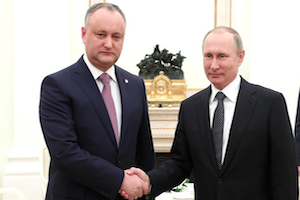The Kurdish "Other" and the American Enemy Ensure the Cohesion of Turkey's Nationalist Regime
By Cengiz Çandar
February 14, 2019
The perception of a Kurdish threat from Syria, abetted by the United States, has provided the Turkish regime with its raison d’être. It is the glue that holds the power coalition of a variety of ultranationalists together. As long as the regime of President Recep Tayyip Erdoğan relies on the Kurdish “other” for its internal cohesion – and ultimately for its survival – that imperative will continue to determine Turkish foreign policy. But Turkey’s strategic reorientation is also sustained by a long history of deep-seated suspicion of American motives. Indeed, Turkish-American relations were never harmonious and their history has taught the Turkish state elite not to trust the United States, and never before had so much been at stake as today.
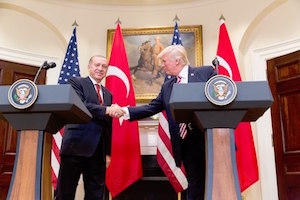
How the Fed Empowered Erdogan, and How It Now Undermines his Rule
By Barış Soydan
February 11, 2019
It is impossible to understand the electoral successes so far of Recep Tayyip Erdoğan, the undisputed leader of Turkey since 2003, without taking the spectacular growth of consumerism in the country into consideration. Notwithstanding the fact that the neoliberal economic policies of the ruling Justice and Development Party (AKP) have disproportionately benefited the wealthiest in Turkish society, low-income earners have also benefited from the economic growth of the last sixteen years. Yet this growth has to a large extent relied on the quantitative easing program of the U.S. Federal Reserve. The end of quantitative easing will be consequential for Erdoğan and his party. Erdoğan is not going to be able to retain the same level of support that he has enjoyed among low-income earners. Get ready for substantial drops in AKP votes in the municipal elections in March.
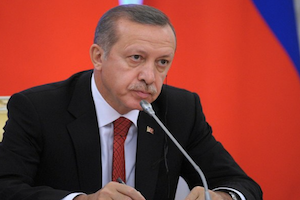
The Adana Protocol Re-Emerges as Russia and Arab Nations Align Against Turkey's Syrian Intervention
By Micha’el Tanchum
January 24, 2019
The December 19, 2018 announcement of the withdrawal of American forces from northeastern Syria was heralded as Washington's concession to Turkey's President Recep Tayyip Erdoğan, giving him a green light for the eradication of the PKK-affiliated Kurdish forces of the People's Protection Units (YPG). However, Turkey's planned intervention to create a 'safe zone' in northern Syria east of the Euphrates river has been complicated by the recent reconciliation of key Arab nations with the regime of Bashar al-Assad to oppose Turkish ambitions. The Arab alignment with Russia's opposition to Turkey's intervention weakened Erdoğan's bargaining position in his January 23, 2019 meeting in Moscow with Russian President Vladimir Putin and may force Turkey to accept alternative arrangements for the safe zone based on the 1998 Adana Protocol between Ankara and Damascus.
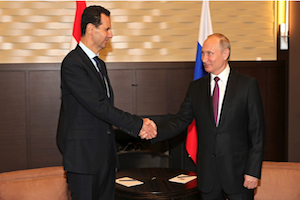
TurkStream: Ankara Embraces Russia to Further Turkey's Hub Ambitions
By Micha’el Tanchum
December 20, 2018
On November 19, 2019, Turkish President Recep Tayyip Erdoğan and Russian President Vladimir Putin held a joint ceremony in Istanbul to mark the completion of the offshore segment of Turkstream, the undersea pipeline that will transport Russian natural gas to Turkey via the Black Sea. Turkstream's now inevitable realization forms a stunning reversal of Turkish energy policy. For more than half a decade, Turkey had focused on reducing its dependency on Russian gas, primarily through the construction of a new pipeline across the length of Turkey to bring gas from Azerbaijan. With Turkey tethered more than ever to Russian gas imports, Moscow appears triumphant. However, Turkey's 'Back to the Future' energy policy belies Ankara's larger strategic gambit to bolster Turkey's international position by becoming a major energy hub.
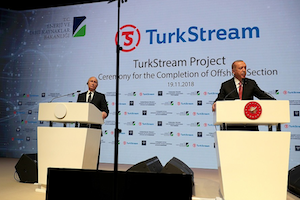
Erdoğan’s Interests Converge with Putin in Moldova’s Gagauzia
By Aykan Erdemir and John Lechner
November 29, 2018
Turkey and Russia’s political and cultural connections to the autonomous region of Gagauzia afford both countries leverage over Moldova. The Orthodox Christian Turkish inhabitants of Gagauzia, known for their favorable sentiments toward Ankara and Moscow, could come to play a key role in Putin and Erdoğan’s converging plans to undermine the Ecumenical Patriarchate, which they both see as an extension of Western interests, and hence, a threat. This strategy is likely to make the Gagauz pawns in both leaders’ greater regional ambitions for territorial and spiritual domination.
